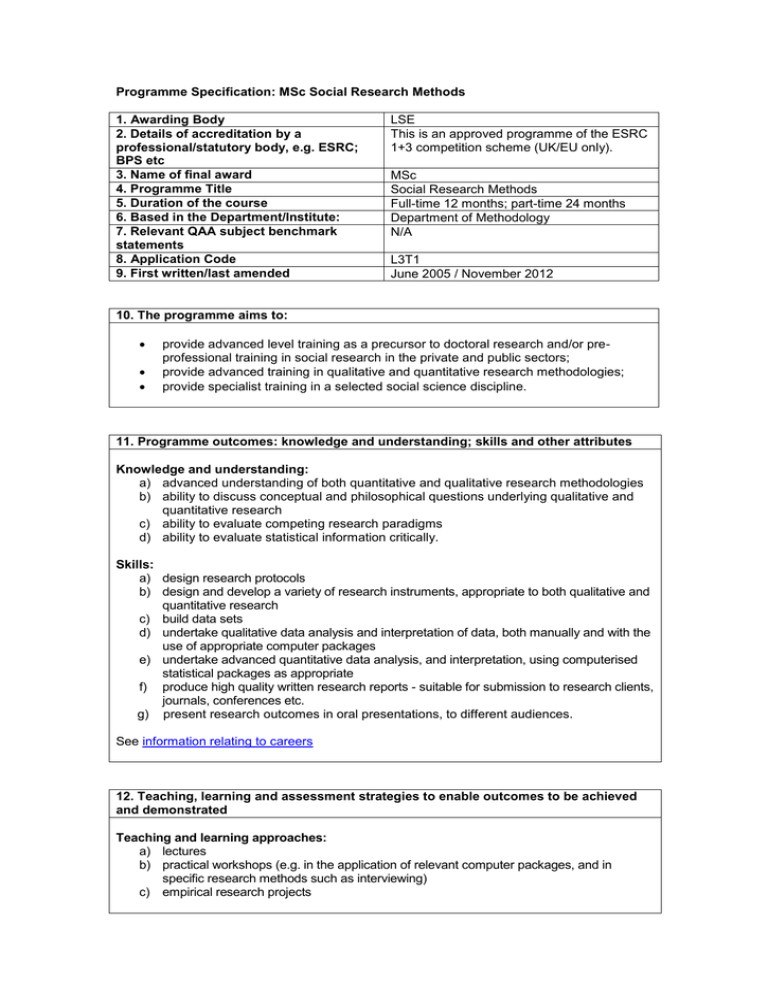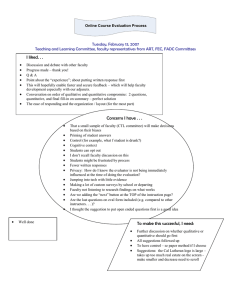Programme Specification: MSc Social Research Methods 1. Awarding Body
advertisement

Programme Specification: MSc Social Research Methods 1. Awarding Body 2. Details of accreditation by a professional/statutory body, e.g. ESRC; BPS etc 3. Name of final award 4. Programme Title 5. Duration of the course 6. Based in the Department/Institute: 7. Relevant QAA subject benchmark statements 8. Application Code 9. First written/last amended LSE This is an approved programme of the ESRC 1+3 competition scheme (UK/EU only). MSc Social Research Methods Full-time 12 months; part-time 24 months Department of Methodology N/A L3T1 June 2005 / November 2012 10. The programme aims to: provide advanced level training as a precursor to doctoral research and/or preprofessional training in social research in the private and public sectors; provide advanced training in qualitative and quantitative research methodologies; provide specialist training in a selected social science discipline. 11. Programme outcomes: knowledge and understanding; skills and other attributes Knowledge and understanding: a) advanced understanding of both quantitative and qualitative research methodologies b) ability to discuss conceptual and philosophical questions underlying qualitative and quantitative research c) ability to evaluate competing research paradigms d) ability to evaluate statistical information critically. Skills: a) design research protocols b) design and develop a variety of research instruments, appropriate to both qualitative and quantitative research c) build data sets d) undertake qualitative data analysis and interpretation of data, both manually and with the use of appropriate computer packages e) undertake advanced quantitative data analysis, and interpretation, using computerised statistical packages as appropriate f) produce high quality written research reports - suitable for submission to research clients, journals, conferences etc. g) present research outcomes in oral presentations, to different audiences. See information relating to careers 12. Teaching, learning and assessment strategies to enable outcomes to be achieved and demonstrated Teaching and learning approaches: a) lectures b) practical workshops (e.g. in the application of relevant computer packages, and in specific research methods such as interviewing) c) empirical research projects d) involvement of professionals from outside academia who are engaged in social research. Assessment a) research project/dissertation b) data portfolio c) symposium d) examinations 13. Programme structures and requirements, levels, modules and awards See the MSc Social Research Methods programme regulations Additional information 14. Criteria for admission to the programme For this programme students should normally have achieved a good upper second-class honours degree or its equivalent, with a significant component in research methodology and experience. They should have an interest and possibly experience in the application of qualitative and/or quantitative methods in social research. 15. Indicators of quality Entrance requirements (see 14 above) The current external examiner says "this course stands out among the best I have encountered" Advanced teaching in quantitative and qualitative methods combined with a disciplinary focus Over the last four years, 60% of students were awarded merit degrees or better. In the same period, 25% of graduates progressed into PhD programmes and, of the others, a majority gained positions in public and private sector research. Authorship of key text in qualitative research and a number of methodological papers in some of the international journals in statistics and political science. The Department of Methodology has a thriving research culture as evidenced by the RAE. The LSE Careers Centre website provides data on career destinations of LSE graduates. 16. Methods for evaluating and improving the quality and standard of teaching and learning Departmental Mechanisms: Two teaching committees (one quantitative, one qualitative) to evaluate and improve the quality of our courses, and give oversight and direction to the development of new courses; Fixed agenda point in staff meetings for each of the teaching committees; Fixed agenda point in staff/student liaison meetings to get feedback on large courses; Informal feedback from GTAs for MY451 (weekly meetings held to monitor teaching and learning). School mechanisms: regular staff appraisal and review; improvements in teaching technique by the Teaching and Learning Centre through observations, advice and further training; induction programme and mentoring scheme for new members of staff; support of Occasional Teachers by the lecturer responsible for a particular module plus the Occasional Teacher Tutor; centrally administered questionnaires by the Teaching Quality Assurance and Review Office; an improved system for ensuring that External Examiners’ comments/recommendations are fed through to Departments and acted upon; the School’s Teaching Quality Assurance Committee which regulates all aspects of teaching quality; LSE’s Graduate School Committee which oversees all postgraduate programmes and ensures that significant changes to programmes and courses pass through a sequence of formal stages so that curricular changes are appropriate and compatible with other developments.


